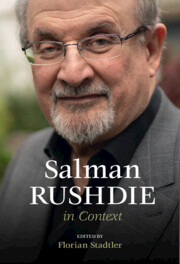Book contents
- Salman Rushdie in Context
- Salman Rushdie in Context
- Copyright page
- Dedication
- Contents
- Contributors
- Acknowledgements
- Introduction
- Part I Life
- Part II Literary and Creative Contexts
- Part III Historical and Cultural Contexts
- Chapter 10 Salman Rushdie and History
- Chapter 11 Religious and Ideological Mythologies in Salman Rushdie’s Novels
- Chapter 12 Revisiting the City in Rushdie’s Fiction
- Chapter 13 Nationalism and Transnationalism in Salman Rushdie’s Novels
- Chapter 14 Rushdie and Globalization
- Chapter 15 Salman Rushdie and Diasporic Identities
- Chapter 16 Rushdie and Secularism
- Chapter 17 Orientalism, Terrorism, and Counterinsurgency in Salman Rushdie’s Novels
- Chapter 18 Salman Rushdie’s Upwardly Mobile, Globally Migrating Middle Classes
- Chapter 19 Scheherazade and Her Cousins
- Chapter 20 Filmi Contexts
- Chapter 21 Salman Rushdie and World-Historical Capitalism
- Chapter 22 The Anthropocene and Ecological Limits in the Works of Salman Rushdie
- Part IV Critical Theoretical Contexts
- Part V Reception, Criticism, and Adaptation
- Works by Salman Rushdie
- Select Bibliography
- Index
Chapter 10 - Salman Rushdie and History
from Part III - Historical and Cultural Contexts
Published online by Cambridge University Press: 23 March 2023
- Salman Rushdie in Context
- Salman Rushdie in Context
- Copyright page
- Dedication
- Contents
- Contributors
- Acknowledgements
- Introduction
- Part I Life
- Part II Literary and Creative Contexts
- Part III Historical and Cultural Contexts
- Chapter 10 Salman Rushdie and History
- Chapter 11 Religious and Ideological Mythologies in Salman Rushdie’s Novels
- Chapter 12 Revisiting the City in Rushdie’s Fiction
- Chapter 13 Nationalism and Transnationalism in Salman Rushdie’s Novels
- Chapter 14 Rushdie and Globalization
- Chapter 15 Salman Rushdie and Diasporic Identities
- Chapter 16 Rushdie and Secularism
- Chapter 17 Orientalism, Terrorism, and Counterinsurgency in Salman Rushdie’s Novels
- Chapter 18 Salman Rushdie’s Upwardly Mobile, Globally Migrating Middle Classes
- Chapter 19 Scheherazade and Her Cousins
- Chapter 20 Filmi Contexts
- Chapter 21 Salman Rushdie and World-Historical Capitalism
- Chapter 22 The Anthropocene and Ecological Limits in the Works of Salman Rushdie
- Part IV Critical Theoretical Contexts
- Part V Reception, Criticism, and Adaptation
- Works by Salman Rushdie
- Select Bibliography
- Index
Summary
This chapter explores the wider context of Salman Rushdie’s engagement with the process of writing history and how his novels respond to specific cultural and historical moments to reveal the complex public debates around the status of history into which Rushdie intervenes. Because Rushdie studied history at university, it is not surprising that his work is deeply embedded in discussing historical thinking and historiography. This is especially related to the history of colonialism and India’s struggle for independence, as well as notions and experiences of migration. In addition he challenges western conceptions of historiography and revisits the Mughal and medieval Islamicate world in ways that explicitly emphasize connections from Persian texts to European intellectual thought. And in many of his novels, including Midnight’s Children, Shalimar the Clown, and The Enchantress of Florence, he consciously plays with how history is produced.
- Type
- Chapter
- Information
- Salman Rushdie in Context , pp. 133 - 146Publisher: Cambridge University PressPrint publication year: 2023

